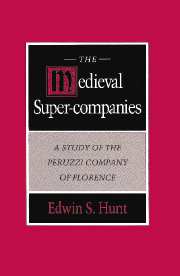Book contents
- Frontmatter
- Contents
- List of tables, figures, and map
- Introduction
- Part I Anatomy of the medieval super-company
- Part II History of the Peruzzi Company from its reorganization in 1300
- 5 The prosperous years, 1300–1324
- 6 The decline begins, 1325–1335
- 7 The critical years, 1335–1340
- 8 The collapse, 1340–1343
- 9 The aftermath
- Conclusions
- Appendixes
- Bibliography
- Index
5 - The prosperous years, 1300–1324
Published online by Cambridge University Press: 08 October 2009
- Frontmatter
- Contents
- List of tables, figures, and map
- Introduction
- Part I Anatomy of the medieval super-company
- Part II History of the Peruzzi Company from its reorganization in 1300
- 5 The prosperous years, 1300–1324
- 6 The decline begins, 1325–1335
- 7 The critical years, 1335–1340
- 8 The collapse, 1340–1343
- 9 The aftermath
- Conclusions
- Appendixes
- Bibliography
- Index
Summary
The year 1300 was a good year for pause and reflection. Pope Boniface VIII had declared it a Jubilee Year, granting full remission of sins to those who spent a stipulated amount of time at the churches of the Blessed Apostles of St. Peter and St. Paul in Rome during the course of the year. This declaration prompted a host of pilgrims to visit that city, bringing with them rich offerings for the church and lucrative business for Roman merchants. Giovanni Villani joined the pilgrimage to the Eternal City and claimed that it was this experience that moved him to begin his famous chronicle of the history of Florence. And Dante, of course, set his Divine Comedy in this year.
Although tensions remained throughout western Europe, 1300 was also a year of relative calm after a decade of political instability. Florence's staunchest ally, Charles II of Naples, had become firmly established and was winding down the long and fruitless struggle to reconquer Sicily. Another important ally, Philip IV of France, had overcome an uprising by his vassal, Count Guy of Flanders, in 1297 and occupied all of the county in 1300. Philip's war with England over Aquitaine had given over to protracted diplomacy following the preliminary peace agreement at Montreuil-sur-Mer in 1299. Harvests had been good, and the general prosperity that gave rise to the super-companies in the thirteenth century seemed ready to be extended comfortably into the fourteenth.
- Type
- Chapter
- Information
- The Medieval Super-CompaniesA Study of the Peruzzi Company of Florence, pp. 127 - 155Publisher: Cambridge University PressPrint publication year: 1994



